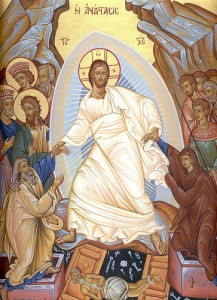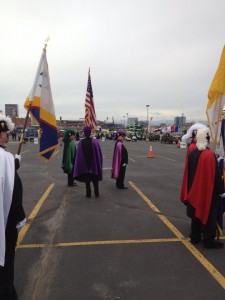No Meat Fridays
 Today is the first week where my family is returning to the practice of abstaining from meat on Fridays. When I touched on this topic a few weeks ago, I pointed out a timely article by Matt Fradd where he explains his reasons for continuing to perform this practice post-Lent. Here, I would like to take the baton from him and explain what led our family to return to this practice.
Today is the first week where my family is returning to the practice of abstaining from meat on Fridays. When I touched on this topic a few weeks ago, I pointed out a timely article by Matt Fradd where he explains his reasons for continuing to perform this practice post-Lent. Here, I would like to take the baton from him and explain what led our family to return to this practice.
First, some background
The simple reason we are to abstain from meat on Fridays is in remembrance of the Lord’s Passion and death. This still enshrined in Canon Law (see the details here), however it points to the conference of bishops to fully determine the specific rules to follow. When we dig deeper, we find a nice summary of both the rationale of the practice and what is prescribed for American Catholics. I encourage you to read the entire section entitled “Christ Died For Our Salvation on Friday”, but I will excerpt some details here:
23. Friday should be in each week something of what Lent is in the entire year. For this reason we urge all to prepare for that weekly Easter that comes with each Sunday by freely making of every Friday a day of self-denial and mortification in prayerful remembrance of the passion of Jesus Christ.
24. Among the works of voluntary self-denial and personal penance which we especially commend to our people for the future observance of Friday, even though we hereby terminate the traditional law of abstinence binding under pain of sin, as the sole prescribed means of observing Friday, we give first place to abstinence from flesh meat.We do so in the hope that the Catholic community will ordinarily continue to abstain from meat by free choice as formerly we did in obedience to Church law. Our expectation is based on the following considerations:
- We shall thus freely and out of love for Christ Crucified show our solidarity with the generations of believers to whom this practice frequently became,especially in times of persecution and of great poverty,no mean evidence of fidelity to Christ and His Church.
- We shall thus also remind ourselves that as Christians, although immersed in the world and sharing its life, we must preserve a saving and necessary difference from the spirit of the world. Our deliberate,personal abstinence from meat, more especially because no longer required by law, will be an outward sign of inward spiritual values that we cherish.
So in summary: they have abolished the binding practice of abstaining from meat (i.e. you don’t have to and it’s not sinful if you do), but they clearly have the hope or intention of individual Catholics continuing the practice or replacing it with some other visible outward sign of our values.
Why We’re Doing It
Like I mentioned in my last article, this all came about because of a few inklings I had of continuing this practice. Matt Fradd’s article came along right around the same time to really drive the point home, and it started a conversation between my wife and I where I discovered that was considering the exact same thing. A lot of tumblers clicked into place and we decided that we would re-enact this practice in our house after Pentecost when the celebratory season of Easter is over.
I had the opportunity to speak to my priest about this, where he also explained that individual Catholics have been called to replace the abstinence from meat with something else if they choose not to practice it. He explained that he would go and visit the poor and the homebound each week, sacrificing his time instead.
I already volunteer a lot of my time in a variety of activities, and my priest’s comment made me consider whether I could just earmark one of those activities as my sacrificed time to satisfy the abstinence/penance requirement. After reflecting on this idea, I came to realize that I don’t do any of those things sacrificially… I actually enjoy serving our parish community in those ways so to me it wasn’t internally consistent to “count” those things. Furthermore, I enjoy the Lenten practice of doing something that causes me to take pause and reflect on why I’m doing it. I enjoy praying the rosary because it takes me through the mysteries of Christ’s life and this practice is a way to reflect on the Sorrowful Mysteries one day each week.
Lastly, I like the sentiments expressed by Section 24.b above. Abstaining from meat is an outward sign of my internal spiritual values. Every Lent I get to respond to the questions about why we abstain from meat, why can you still eat fish, and so on… this continues that visible practice in such a way that it gets noticed by people. It gives me a chance to evangelize with my actions and it has regularly started a discussion about my Catholic faith. Sacrificing a cheeseburger is a small price to pay if it eventually leads someone closer to Christ.
I’m going to heat up my cheese quesadilla now!


